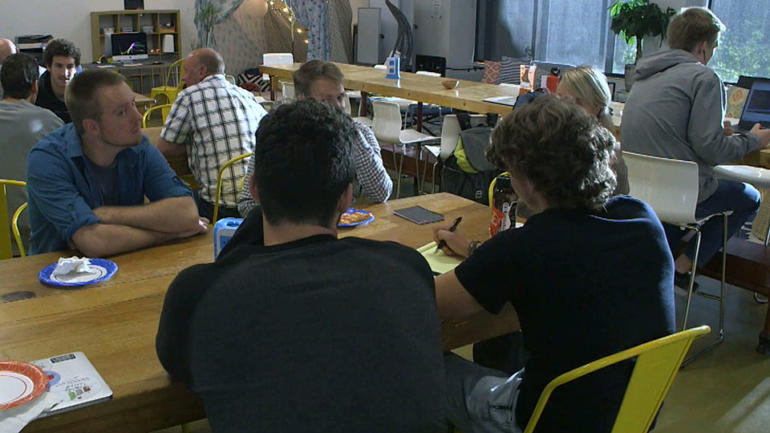It’s become a big focus for U.S. colleges: helping students become entrepreneurs by giving them the tools they need to form successful businesses. According to one study, the share of incubator programs associated with universities has now grown to 42 percent.
CGTN’s Hendrik Sybrandy reports.
At the University of Colorado Boulder recently, students, faculty and others gathered to celebrate innovation and entrepreneurship. The goal – to give a nudge to those with business ideas.
“We want to spark that entrepreneurial spirit,” the host of the Innovation and Entrepreneurship Campus Kickoff told the assembled crowd. Entrepreneurship is a hot topic at U.S. colleges these days.
“This has become a national trend, really,” said Sarabeth Berk, Director of Innovation and Entrepreneurship at C.U. Boulder. The school offers classes, resources and workspace to students to help them launch new products and services.
“So my role is to create all of the things that you need to be on the entrepreneurial journey wherever you are,” Berk said.
Among the companies that began that journey on the Boulder campus is Specdrums, which makes app-connected rings that turn color into sound. Its founder says what better time to invent something than while enrolled in school.
“Compared to being an adult, you don’t have many responsibilities,” Steven Dourmashkin, Specdrums’ Founder said. “It’s the time to fail and try new things. And try to do what you love to do.”
Specdrums, now owned by the robotic toymaker Sphero, took part in a two-month startup accelerator at the university. So did Noble Roots Kitchen, whose snack delivery service began as a grad school project.
“You could obviously do this in the real world but I feel like the stakes are a lot higher, but when you’re in school, it’s a lot easier,” said Erin Stenzel, Noble Roots co-founder. “You can fail fast, fail often, and just iterate really quickly to get your ideas and your business off the ground running.”
Like other startups, Artemus, which makes artificial muscles for robots, relied on mentors to help develop its product. Easier to do in a tech-rich place like Boulder.
“I didn’t even know what an accelerator was when we started all of this, and this C.U. entrepreneurship program just kind of got us up to speed in a very short amount of time,” said Tim Morrissey, a C.U. Boulder graduate student and one of the brains behind Artemus.
C.U. Boulder claims licenses and patents granted to its startups are on the rise these days. According to one study, the share of incubator programs associated with universities has now grown to 42 percent. The university says this is how it stays current in terms of what it offers students and how it attracts new ones.
“I don’t think there’s anything in it for us,” Berk said. “It’s the way of the future, that in order to be a leader and to change the world, you need to be an action taker, you need to solve big problems and you need to collaborate with people from different disciplines.”
Students often gather in the campus Startup Hub to trade thoughts and vet their ideas.
“I love the pace and the creativity behind it,” said one student.
“We’re seeing double or triple the amount of participants and engagement that we have in prior years,” Berk said. “And I feel like we’re just at the beginning.”
Innovation and learning – they’re linked on campus like never before.
Rhonda Shrader discusses universities and how they are nurturing entrepreneurship on campuses
For more on how education institutions are capitalizing on entrepreneurship,CGTN’s Rachelle Akuffo spoke with Rhonda Shrader, executive director of Berkeley-Haas Entrepreneurship Program.
 CGTN America
CGTN America

